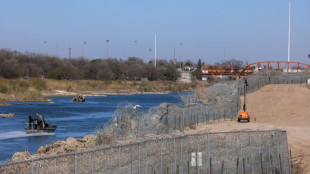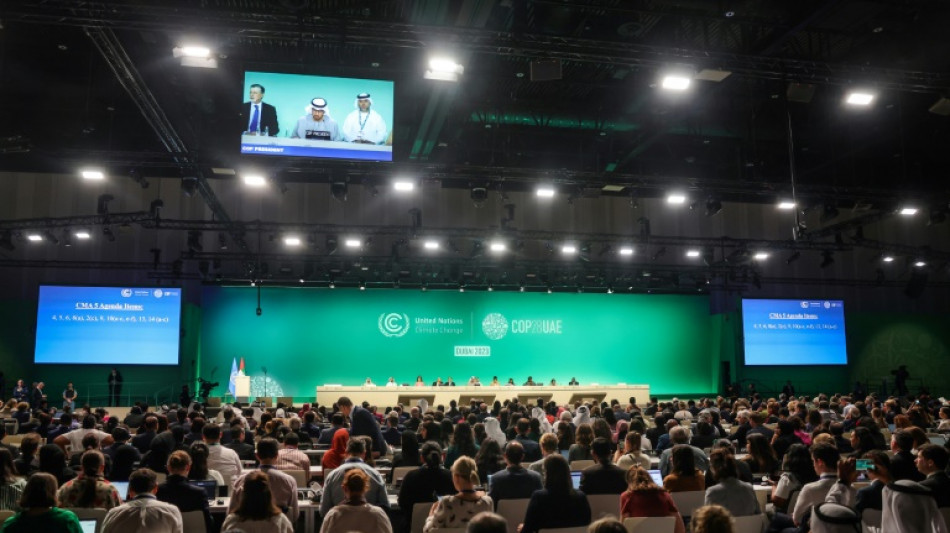
-
 Altomare hangs on to tie defending champ Korda at LPGA Match Play
Altomare hangs on to tie defending champ Korda at LPGA Match Play
-
Paraguay gold rush leaves tea producers bitter

-
 Health concerns swirl as Bolivian city drowns in rubbish
Health concerns swirl as Bolivian city drowns in rubbish
-
Syria says deadly Israeli strikes a 'blatant violation'

-
 Financial markets tumble after Trump tariff announcement
Financial markets tumble after Trump tariff announcement
-
Starbucks faces new hot spill lawsuits weeks after $50mn ruling

-
 Europe riled, but plans cool-headed response to Trump's tariffs
Europe riled, but plans cool-headed response to Trump's tariffs
-
'Shenmue' voted most influential video game ever in UK poll

-
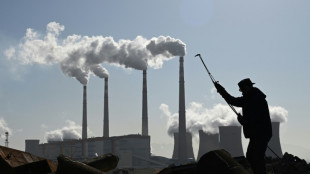 New coal capacity hit 20-year low in 2024: report
New coal capacity hit 20-year low in 2024: report
-
Revealed: Why monkeys are better at yodelling than humans

-
 Key details on Trump's market-shaking tariffs
Key details on Trump's market-shaking tariffs
-
'A little tough love': Top quotes from Trump tariff talk
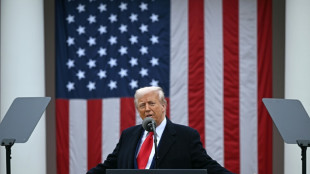
-
 US business groups voice dismay at Trump's new tariffs
US business groups voice dismay at Trump's new tariffs
-
Grealish dedicates Man City goal to late brother

-
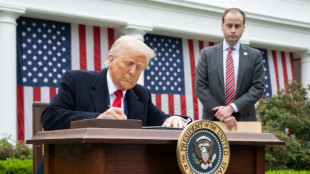 US tariffs take aim everywhere, including uninhabited islands
US tariffs take aim everywhere, including uninhabited islands
-
Trump sparks trade war with sweeping global tariffs
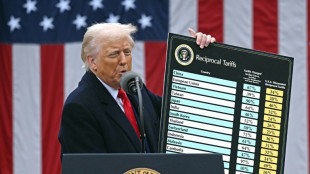
-
 Israeli strikes hit Damascus, central Syria; monitor says 4 dead
Israeli strikes hit Damascus, central Syria; monitor says 4 dead
-
Slot 'hates' offside rule that gave Liverpool win over Everton

-
 US stocks end up, but volatility ahead after latest Trump tariffs
US stocks end up, but volatility ahead after latest Trump tariffs
-
Barca oust Atletico to set up Clasico Copa del Rey final

-
 Mourinho grabs Galatasaray coach's face after losing Istanbul derby
Mourinho grabs Galatasaray coach's face after losing Istanbul derby
-
Grealish strikes early as Man City move up to fourth in Premier League

-
 Reims edge out fourth-tier Cannes to set up PSG French Cup final
Reims edge out fourth-tier Cannes to set up PSG French Cup final
-
Liverpool beat Everton as title looms, Man City win without Haaland

-
 Jota wins bad-tempered derby as Liverpool move 12 points clear
Jota wins bad-tempered derby as Liverpool move 12 points clear
-
Inter and Milan level in derby Italian Cup semi

-
 Stuttgart beat Leipzig to reach German Cup final
Stuttgart beat Leipzig to reach German Cup final
-
Trump unveils sweeping global tariffs
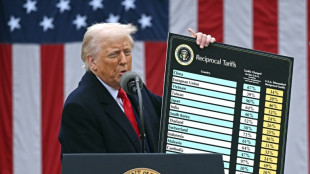
-
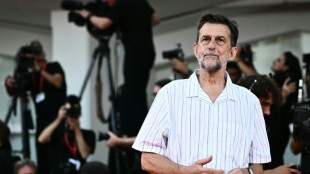 Italian director Nanni Moretti in hospital after heart attack: media
Italian director Nanni Moretti in hospital after heart attack: media
-
LIV Golf stars playing at Doral with Masters on their minds

-
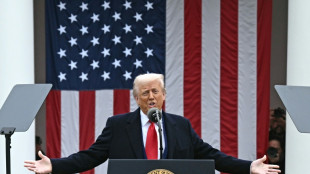 Trump unveils sweeping 'Liberation Day' tariffs
Trump unveils sweeping 'Liberation Day' tariffs
-
Most deadly 2024 hurricane names retired from use: UN agency

-
 Boeing chief reports progress to Senate panel after 'serious missteps'
Boeing chief reports progress to Senate panel after 'serious missteps'
-
Is Musk's political career descending to Earth?

-
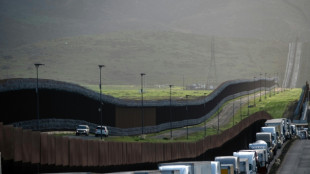 On Mexico-US border, Trump's 'Liberation Day' brings fears for future
On Mexico-US border, Trump's 'Liberation Day' brings fears for future
-
Starbucks faces new hot spill lawsuit weeks after $50mn ruling

-
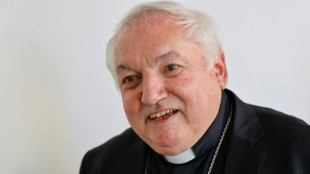 Ally of Pope Francis elected France's top bishop
Ally of Pope Francis elected France's top bishop
-
'Determined' Buttler leads Gujarat to IPL win over Bengaluru

-
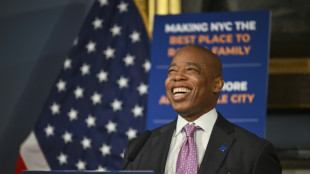 US judge dismisses corruption case against New York mayor
US judge dismisses corruption case against New York mayor
-
Left-wing party pulls ahead in Greenland municipal elections
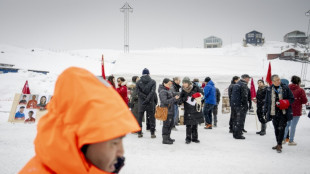
-
 Blistering Buttler leads Gujarat to IPL win over Bengaluru
Blistering Buttler leads Gujarat to IPL win over Bengaluru
-
Tesla sales slump as pressure piles on Musk
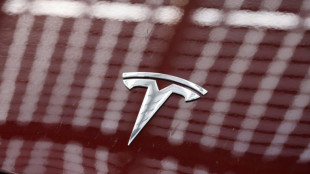
-
 Amazon makes last-minute bid for TikTok: report
Amazon makes last-minute bid for TikTok: report
-
Canada Conservative leader warns Trump could break future trade deal
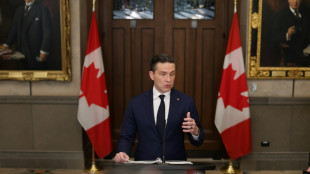
-
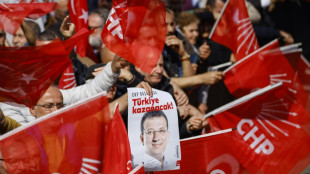 British band Muse cancels planned Istanbul gig
British band Muse cancels planned Istanbul gig
-
'I'll be back' vows Haaland after injury blow

-
 Trump to unveil 'Liberation Day' tariffs as world braces
Trump to unveil 'Liberation Day' tariffs as world braces
-
New coach Edwards adamant England can win women's cricket World Cup
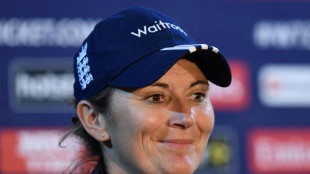
-
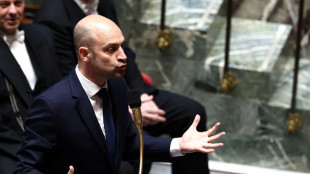 Military confrontation 'almost inevitable' if Iran nuclear talks fail: French FM
Military confrontation 'almost inevitable' if Iran nuclear talks fail: French FM
-
US stocks advance ahead of looming Trump tariffs


Nations to submit boosted climate plans: what's at stake?
Nations have begun setting carbon-cutting targets for the decade ahead, and how ambitious these pledges are could make or break global efforts to avoid dangerous levels of climate change.
Nearly 200 countries are supposed to publish updated climate plans by early February, but so far only three have done so.
On Wednesday, the UK became the latest, announcing during the COP29 climate summit in Azerbaijan that it would raise its target to cut greenhouse gas emissions.
All eyes will be on other big polluters like China, India and the United States, though future US climate action is unclear following Donald Trump's election.
- Why do they matter? -
The world has agreed to try and limit global warming to 1.5 degrees Celsius above pre-industrial levels, but is nowhere near on track.
Above this threshold, scientists say humanity risks disastrous consequences from volatile weather to major ecological "tipping points" at land and sea.
Last month, the United Nations warned that even if all existing plans are implemented in full, temperatures would rise 2.6C by the century's end, a catastrophic outcome.
The UN says the next round of climate plans must show a "quantum leap" in ambition to avert the worst.
The G20 -- which accounts for 77 percent of total greenhouse gas emissions -- is under particular pressure to step up.
- Early movers -
Just before COP29 opened in Azerbaijan, the United Arab Emirates announced a 47 percent reduction in emissions by 2035 compared with 2019 in its updated climate plan.
Observers said the roadmap failed to account for exported emissions -- including those from its sales of crude oil abroad.
Next year's UN climate host, Brazil, has partly unveiled its plan, increasing its emissions reduction target from a 59 percent cut by 2035, from 2005 levels, to a 67 percent reduction.
It is expected to unveil a more complete plan during COP29.
Plans from other major emitters, like the European Union and China, are not expected until next year.
And the current US government could soon outline Washington's new pledge, despite questions over Trump following through once in office.
David Waskow, of the World Resources Institute, said it would help guide American cities, states and businesses wishing to continue climate action under Trump.
"It also sends an important signal internationally, a set of benchmarks for what the US ought to do," he added.
- What do countries need to do? -
By signing the Paris accord, nearly 200 nations agreed to halt rising temperatures "well below 2C" and strive for the safer goal of 1.5C.
But it did not prescribe how to get there.
The deal left it up to countries to voluntarily chart their own plans and targets, known as Nationally Determined Contributions (NDCs).
These include emission reduction targets and measures to achieve them, such as rolling out renewable energy, electrifying transport, and ending deforestation.
There is no set template for countries to follow but richer countries -- historically the largest emitters -- have a responsibility to pledge the deepest emission cuts.
The plans must be reviewed every five years, with each update supposed to be more ambitious than the last.
This time around countries are expected to improve their 2030 targets and outline economy-wide action they will take to 2035.
- What's the aim? -
An agreement at last year's COP28 climate summit "encouraged" countries to come forward with plans aligned with halting warming to 1.5C.
To have a hope of meeting that goal, emissions must be slashed 42 percent by 2030 and 57 percent by 2035, the UN's Environment Programme said last month.
Currently, however, emissions are continuing to rise.
Keeping 1.5C on track would require a collective effort "only ever seen following a global conflict", it added.
Without pulling together "on a scale and pace never seen before... the 1.5C goal will soon be dead," said UNEP executive director Inger Andersen.
The big moment for assessing progress towards the 1.5C goal comes at a crunch COP30 climate summit in Brazil next year.
- What about fossil fuels? -
Scientists and the International Energy Agency have said that developing new fossil fuel projects is incompatible with halting warming to 1.5C.
But many fossil fuel producing countries argue that new oil and gas projects will be needed as the world transitions to net zero emissions.
Countries are under pressure to outline in their updated plans how they intend to reduce their reliance on fossil fuels, something all nations agreed at last year's COP.
Ch.Kahalev--AMWN



